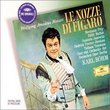| All Artists: Francis Poulenc, Seiji Ozawa, Barbara Bonney, Jean-Paul Fouchécourt, Saito Kinen Orchestra, Tokyo Opera Singers, Wolfgang Holzmair, Jean-Philippe LaFont, Anthony Dean Griffey, Graham Clark, Gordon Gietz Title: Poulenc - Les mamelles de Tirésias & Le Bal masqué / Bonney, Holzmaier, Fouchécourt, Lafont, Griffey, Clark, Saito Kinen Orchestra, Ozawa Members Wishing: 0 Total Copies: 0 Label: Philips Release Date: 2/9/1999 Genres: Pop, Classical Styles: Vocal Pop, Opera & Classical Vocal, Symphonies Number of Discs: 1 SwapaCD Credits: 1 UPC: 028945650425 |
Search - Francis Poulenc, Seiji Ozawa, Barbara Bonney :: Poulenc - Les mamelles de Tirésias & Le Bal masqué / Bonney, Holzmaier, Fouchécourt, Lafont, Griffey, Clark, Saito Kinen Orchestra, Ozawa
 | Francis Poulenc, Seiji Ozawa, Barbara Bonney Poulenc - Les mamelles de Tirésias & Le Bal masqué / Bonney, Holzmaier, Fouchécourt, Lafont, Griffey, Clark, Saito Kinen Orchestra, Ozawa Genres: Pop, Classical
Set to a text by Guillaume Apollinaire that combines nonsensical images with some serious underlying thoughts, Les mamelles de Tirésias is a 52-minute, two-act operatic romp and makes a fascinating contrast to Poulenc... more » |
Larger Image |
CD DetailsSynopsis
Amazon.com Set to a text by Guillaume Apollinaire that combines nonsensical images with some serious underlying thoughts, Les mamelles de Tirésias is a 52-minute, two-act operatic romp and makes a fascinating contrast to Poulenc's more familiar La voix humaine. With his usual pert lyricism and cabaret-like rhythmic underpinnings, the composer keeps his listeners thoroughly entertained. Along with Apollinaire, Max Jacobs was a leader of the Dada movement, and some of his rather illogical poems were delightfully set as a cantata for baritone and small instrumental ensemble as Le bal masqué. Wolfgang Holzmair sings effectively, as does the entire cast for Les mamelles. The orchestra plays with great proficiency, and the international cast sings well. If the opera performance lacks the charm of the early-1950s Angel recording by André Cluytens, there is no use crying over spilt milk. The new version is far better recorded and is the only one currently available. --Paul Turok Similarly Requested CDs
|
CD ReviewsDelightful work, beautifully executed! Mr. DAVID Geer | Sydney Australia | 04/11/1999 (4 out of 5 stars) "I saw and heard the principle work on this disk at the London Coliseum some years ago, when it was part of a triple act with the Seven Deadly Sins. The latter was the first work of the evening and the smart set had fully booked the performances out. A fair number also left immediately afterwards not knowing or caring about what was to follow.Fools, all of them, for like the performance on this disk, Tiresias was the star of the work and the evening. Beautifully and quirkilly realised and sung by a team of quality soloists having a good time. This is all repeated on this disk but it's a shame about the language. The ENO nearly always perform English (translation as they did that year) and although Bonney and colleagues' dictation is very good, my French simply looses out a little. Not helped out much of course by the brochure which is printed in cute but largely tedious to read fonts. Something one of my kids would use to play with on the computer!That said it is small quibble over an excellent CD and Bonney provides almost perfect singing of the soubrette role of Tiresias. As to the filler it pails in comparison but is performed with vigour.One of the CD's you will play and play again and never regret purchasing! Very well recorded as you would expect of a recording made in Japan. The orchestra sounds world-class too!" Essential for Poulenc students, delightful for all R. Gregory Capaldini | Arlington, VA United States | 08/14/2003 (4 out of 5 stars) "I would concur with those who assert that the Cluytens-led recording from the 1950s has a bit more stylistic panache than this one. However, there is a most interesting detail pointed out on the labeling of this disc: Assuming the documentation is correct, what we get here is a "1963" revision of Poulenc's opera that premiered in 1947 but, as pointed out in Carl Schmidt's book "Entrancing Muse: A Documented Biography of Francis Poulenc" (Pendragon, 2001), was actually completed in 1945. Schmidt also informs us that Poulenc went to Milan in December of 1962 to oversee plans for an April 1963 production at Milan's Piccola Scala. (As many Poulenc fans would point out, the composer never saw the new production, succumbing to a heart attack in his Paris apartment in January of 1963.) And so, I wonder: Could it be that he had made revisions to the score for the then-prospective Milan production? Listening to this performance led by Ozawa, my ear picks up numerous instrumental details that are either obscured in the drily-recorded Cluytens or -- am I nuts to suspect? -- better projected in the revised score. Finally, I'd like to add my own appreciation for the dapper work of the chorus in this performance, particularly their post-duel number and the rapid-fire finales of both Acts. Warmly recommended!" A Delightful and Charming Opera D. A Wend | Buffalo Grove, IL USA | 04/04/2002 (5 out of 5 stars) "I was unfamiliar with this opera until I heard a performance over the radio from the Met in New York. The music was so delightful that I had to have a performance for myself. This one, conducted by Seiji Ozawa is excellent indeed. The earlier recording of this opera by Andre Cluytens is likewise excellent, and features Poulenc's favorite, soprano Denise Duval. Sonically, that recording is quite dated (48 years old at present) and the Ozawa recording certainly measures up to the Cluytens with an excellent cast and fabulous playing by the Saito Kinen Orchestra. Both recordings compliment each other.The opera is based on a Surreal play by Guillame Apollinaire, and Poulenc entered into the buffoonery by complementing Apollinaire's puns with a musical equivalent. Poulenc's music is charming and melodious. The cast is superb and includes Barbara Bonney, Jean-Philippe Lafont, Jean-Paul Fouchecourt and Graham Clark. Le Bal masque, a setting of poems by Max Jacob and included as filler, is also well played and sung by Wolfgang Holzmair, who sings the Policeman in the opera. This is an excellent disc that belongs in every collection of French opera."
|

 Track Listings (24) - Disc #1
Track Listings (24) - Disc #1






![Gershwin: Porgy & Bess [With Members of the Original Cast]](https://nationalbookswap.com/cd//m/71/7871/117871.jpg)

